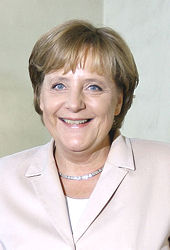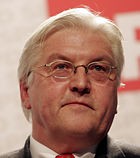German federal election, 2017
From Usgs
| ||||
 |  | |||
| Leader | | | ||
| Party | | | ||
| Leader since | | | ||
| Last election | | | ||
| Seats won | | | ||
| Seats change | | | ||
| Percentage | | | ||
| Swing | | | ||
The 19th German federal election, 2017 was conducted in 2017 to elect members to the Bundestag (lower house) of Germany.
Contents |
Overview
The major issues of the election were the economy and immigration. The Angela Merkel led CDU-CSU government was helped by its tough stance on immigrants but hurt by Germany's economic performance and its recession in 2015. The opposition SPD, led by Frank-Walter Steinmeier, was helped by the focus on the economy, but hurt by it's less aggressive stance on immigration.
Election results
The election saw a shift in voter support move from the Greens-Left and CDU-CSU to the SPD and from the FDP to the NPD. The success of the NPD in achieving over 5% of the vote meant a removal of overhang seats in the Bundestag, reducing the overall number of seats in the chamber.
| German federal election, 2017 | |||||
|---|---|---|---|---|---|
| Party | Seats | Net Gain/Loss | Vote | +/- | |
| Christian Democratic Union-Christian Social Union (I) | 246 | -23 | 39% | -5% | |
| Social Democratic Party | 187 | +21 | 30% | +9% | |
| Free Democratic Party | 66 | -56 | 10% | -8% | |
| National Democratic Party | 61 | +46 | 10% | +8% | |
| Greens-Left Party | 54 | -15 | 9% | -3% | |
| Total | 614 | -27 | |||
| Source: CDU/CSU wins election, reduced majority | |||||
Aftermath
With no single party having an absolute majority, there appeared to be 2 likely coalition groupings: a of the CDU-CSU/FDP coalition or a CDU-CSU/SPD grand coalition. What was understood to have been Merkel's prefered option, a CDU-CSU/NPD coalition, fell 1 seat short of absolute majority, as would a broad SPD/FDP/Greens-Left coalition. The result was a continuation of the 8 year old CDU-CSU/FDP coalition.
See Also
External links
| German federal elections |
|---|
| 2009 | 2017 | Next |
